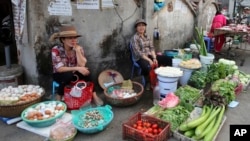Businesses in Vietnam face a cash shortage that is preventing as much as $24 billion that could be invested in the nation’s $250 billion economy, according to a study by PwC Vietnam.
The financial services company analyzed the 500 businesses in Vietnam with the highest revenue that have been listed on both the Ho Chi Minh City Stock Exchange and the Hanoi Stock Exchange for the last four years or more. PwC Vietnam analysts said that those companies’ “cash conversion cycle” has increased, meaning that they have to wait longer from the start of the business cycle, when they first make their investments, until those investments start to pay off in the form of revenue.
“We continue to see cash flows being sacrificed to attain top line targets in Vietnam, which is not sustainable for businesses in the long run,” said Mohammad Mudasser, who leads the working capital management practice at PwC Vietnam. “Managing operating working capital is a cross-functional responsibility," he added.
Top line refers to revenue, while bottom line refers to profit.
To sacrifice cash for the sake of revenue targets usually means that companies are willing to make an initial cash investment, often to buy inventory that can be sold for revenue. However the long cash conversion cycle suggests that there are some inefficiencies along the way, such as longer wait times between billing a customer and actually collecting the payment.
While there is no perfect business cycle, the PwC Vietnam study suggests companies in Vietnam could tackle some inefficiencies to unlock further potential in the already fast growing economy.
In 2018 Vietnam had one of the highest cash conversion cycles in Asia, at 67 days, which is an increase of two days compared with 2017, according to PwC Vietnam. That compares with an average in Asia of 58 days, and in particular 64 days in neighboring Thailand and 54 in Malaysia. That means those other Southeast Asian countries are able to turn their investments into cash sooner than Vietnam does.
One reason that companies do not want to have such a long cycle is that it makes them more vulnerable to debt. When they have to wait a longer time to receive payment from customers, some companies go into debt to cover their expenses.
“The fast-growing companies had significantly higher short term debt growth, indicating risks to the sustainable growth of these companies,” PwC Vietnam, a consulting company that sells tax and accounting services, said in a press release.
If the U.S. Federal Reserve Bank increases interest rates in the coming year, as some economists are expecting, emerging markets, such as Vietnam, could follow. That would increase borrowing costs for companies, increasing their vulnerability to debt.
In turn that could limit the economy’s potential. The Asian Development Bank estimates that Vietnam's gross domestic product grew by 6.9% in 2019 and will grow by 6.8% in 2020.
PwC Vietnam looked at the inventory, expenses, and outstanding invoices of the 500 listed companies that it analyzed. Based on that, it estimated there was $24 billion “trapped in net working capital.”
However it estimated that only a fraction of that capital could be released, $11 billion, because some of the capital has to stay in the business cycle. Analysts said inventory and outstanding invoices, known as accounts receivable, where the best bet for improving efficiency. That could mean that too much inventory is being held, or that companies are waiting too long to be paid by customers.











